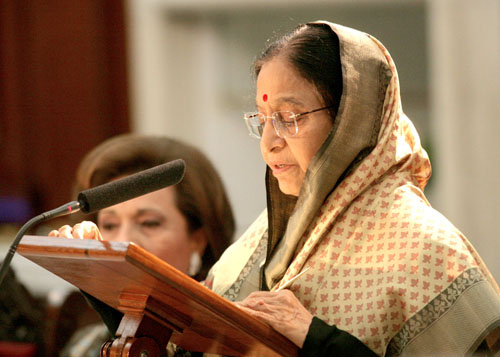
SPEECH BY THE PRESIDENT OF INDIA, SMT. PRATIBHA DEVISINGH PATIL AT THE BANQUET IN HONOUR OF THE PRESIDENT OF THE ARAB REPUBLIC OF EGYPT, H.E MR. MOHAMED HOSNY MUBARAK
New Delhi, 18th November 2008

Your Excellency, Mr. Mohamed Hosny Mubarak, President of the Arab Republic of Egypt,
Madame Mubarak,
Excellencies,
Distinguished Guests,
Ladies and Gentlemen,
It gives us great pleasure to extend a warm welcome to you, Excellency, to Madame Mubarak and to the members of your delegation on your State Visit to India. Your visit comes after a long gap of over twenty-five years but is, nevertheless, another major landmark in the long history of our relations as civilisations and nations. We welcome you once again as a true friend of India, as a partner in non-aligned solidarity and as a world leader of great distinction and repute.
The history of our relations as two ancient lands is being rediscovered each day. Our ties date to Pharaonic times. In the Roman period, there were well-established trade routes linking ports in Western and Southern India to those on the Red Sea. Most recently, archaeologists have been unearthing an important site at Berenike on Egypt's Red Sea coast that promises to revolutionise our understanding of the wide extent of these ancient maritime and commercial links that must have also brought us together as kindred cultures.
In modern times, India and Egypt were brought together by common struggles and shared aspirations. We are aware of the friendship and mutual respect between Mahatma Gandhi and Sa'ad Zaghloul. Jawaharlal Nehru and Maulana Abul Kalam Azad did much to revitalise India's political and cultural links to Egypt. After Indian independence in 1947 and the July 1952 Revolution in Egypt, strong ideological bonds developed between our two countries, leaders and peoples.
The strength and the diversity of these ties were visible not only in momentous events such as the Bandung Conference of 1955 or during the Suez crisis of the following year but were there for all to see in the popular adoration of Indian cinema such as "Mother India" and Raj Kapoor's "Sangam".
As young nations, we shared the goals and values for consolidating national independence and sovereignty as well as for achieving socio-economic development and raising the standard of living of our people.
Excellency,
Today, we are pleased to welcome you not only as the representative of an ancient civilization, but also as the leader of a friendly and vibrant nation which has been making impressive achievements in recent years in promoting socio-economic development and economic growth.
We have worked together in the Non-Aligned Movement, in the United Nations, and in the Group of 77 and other international fora to defend the political and economic interests of developing countries and for promoting South-South Cooperation.
We are confident that Egypt will contribute to the revitalization of NAM during its forthcoming chairmanship. We share a common interest in combating international terrorism that threatens the stability and security of nation-states and violates the most basic of human rights, namely the right to life.
In recent years, we have had successful experiences in economic reform and liberalisation, including de-regulation and disinvestment. These have thrown open new opportunities to our business, industrial and technological communities to work together to mutual benefit. I am happy that Indian investments in Egypt have been increasing steadily and are poised to exceed US$ 2 billion within the next two years.
India is ready to share its development experience with close friends such as Egypt. I am pleased to note that we have signed agreements during Your Excellency's current visit in order to expand and consolidate our cooperation. These, I believe, will form the basis for building further cooperation.
We have also admired Egypt's important role in contributing to peace in West Asia, a region that we ourselves regard as our extended neighbourhood. India has consistently voiced its unequivocal support for the Palestinian cause and for the peace process in West Asia. In this regard, we look forward to working closely with Egypt and benefiting from its wise counsel. A just and comprehensive peace in the region, in which the legitimate aspirations of the Palestinian people for a sovereign, viable and independent state, living at peace with Israel and within secure and recognised borders, would be met is imperative.
May I now invite Your Excellency and all distinguished guests to raise a toast: -
- to His Excellency, Mr. Mohamed Hosny Mubarak, President of the Arab Republic of Egypt;
- to the progress and prosperity of Egypt; and
- to ever-lasting friendship between India and Egypt.
********
|

